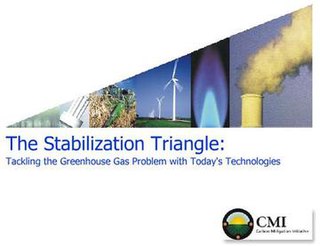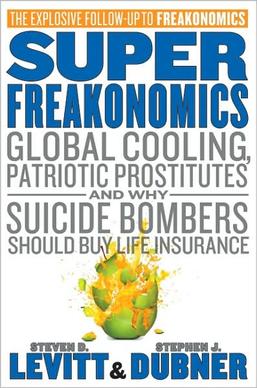
The Hype About Hydrogen: Fact and Fiction in the Race to Save the Climate is a book by Joseph J. Romm, published in 2004 by Island Press and updated in 2005. The book has been translated into German as Der Wasserstoff-Boom. Romm is an expert on clean energy, advanced vehicles, energy security, and greenhouse gas mitigation.

The politics of climate change results from different perspectives on how to respond to climate change. Global warming is driven largely by the emissions of greenhouse gases due to human economic activity, especially the burning of fossil fuels, certain industries like cement and steel production, and land use for agriculture and forestry. Since the Industrial Revolution, fossil fuels have provided the main source of energy for economic and technological development. The centrality of fossil fuels and other carbon-intensive industries has resulted in much resistance to climate friendly policy, despite widespread scientific consensus that such policy is necessary.

Joseph J. Romm is an American researcher, author, editor, physicist and climate expert, who advocates reducing greenhouse gas emissions to limit global warming and increasing energy security through energy efficiency and green energy technologies. Romm is a Fellow of the American Association for the Advancement of Science. In 2009, Rolling Stone magazine named Romm to its list of "100 People Who Are Changing America", and Time magazine named him one of its "Heroes of the Environment (2009)", calling him "The Web's most influential climate-change blogger".
The Pigou Club is described by its creator, economist Gregory Mankiw, as a “group of economists and pundits with the good sense to have publicly advocated higher Pigovian taxes, such as gasoline taxes or carbon taxes." A Pigovian tax is a tax levied to correct the negative externalities of a market activity. These ideas are also known as an ecotaxes or green tax shifts.

Hell and High Water: Global Warming – the Solution and the Politics – and What We Should Do is a book by author, scientist, and former U.S. Department of Energy official Joseph J. Romm, published December 26, 2006. The author is "one of the world's leading experts on clean energy, advanced vehicles, energy security, and greenhouse gas mitigation."

Renewable energy commercialization involves the deployment of three generations of renewable energy technologies dating back more than 100 years. First-generation technologies, which are already mature and economically competitive, include biomass, hydroelectricity, geothermal power and heat. Second-generation technologies are market-ready and are being deployed at the present time; they include solar heating, photovoltaics, wind power, solar thermal power stations, and modern forms of bioenergy. Third-generation technologies require continued R&D efforts in order to make large contributions on a global scale and include advanced biomass gasification, hot-dry-rock geothermal power, and ocean energy. In 2019, nearly 75% of new installed electricity generation capacity used renewable energy and the International Energy Agency (IEA) has predicted that by 2025, renewable capacity will meet 35% of global power generation.

Jeremy Leggett is a British social entrepreneur and writer. He founded and was a board director of Solarcentury from 1997 to 2020, an international solar solutions company, and founded and was chair of SolarAid, a charity funded with 5% of Solarcentury's annual profits that helps solar-lighting entrepreneurs get started in Africa (2006–2020). SolarAid owns a retail brand SunnyMoney that was for a time Africa's top-seller of solar lighting, having sold well over a million solar lights, all profits recycled to the cause of eradicating the kerosene lantern from Africa.

Greenhouse Solutions with Sustainable Energy is a 2007 book by Australian academic Mark Diesendorf. The book puts forward a set of policies and strategies for implementing the most promising clean energy technologies by all spheres of government, business and community organisations. Greenhouse Solutions with Sustainable Energy suggests that a mix of efficient energy use, renewable energy sources and natural gas offers a clean and feasible energy future for Australia.

Climate stabilization wedges are used to describe possible climate change mitigation scenarios and their impact, through the grouping of different types of interventions into "wedges" representing potential decreases in CO2 emissions. When stacked on top of each other, wedges form a "stabilization triangle" that represents the estimated amount of carbon that needs to be removed from the atmosphere to flatten carbon emissions and prevent atmospheric carbon from doubling. This framework is used to organize complex information about mitigation strategies for presentation to policy makers and the public, with the goal of stimulating both technological change and policy actions to deploy precommercial and existing technologies.

The Clean Tech Revolution: The Next Big Growth and Investment Opportunity is a 2007 book by Ron Pernick and Clint Wilder, who say that commercializing clean technologies is a profitable enterprise that is moving steadily into mainstream business. As the world economy faces challenges from energy price spikes, resource shortages, global environmental problems, and security threats, clean technologies are seen to be the next engine of economic growth.

Our Choice is a 2009 book written by former U.S. Vice President Al Gore and published by Rodale, Inc. in Emmaus, Pennsylvania.
New Energy for America was a plan led by Barack Obama and Joe Biden beginning in 2008 to invest in renewable energy sources, reduce reliance on foreign oil, address global warming issues, and create jobs for Americans. The main objective of the New Energy for America plan was to implement clean energy sources in the United States to switch from nonrenewable resources to renewable resources. The plan led by the Obama Administration aimed to implement short-term solutions to provide immediate relief from pain at the pump, and mid- to- long-term solutions to provide a New Energy for America plan. The goals of the clean energy plan hoped to: invest in renewable technologies that will boost domestic manufacturing and increase homegrown energy, invest in training for workers of clean technologies, strengthen the middle class, and help the economy.

Christopher Frank William Goodall is an English businessman, author and expert on new energy technologies. He is an alumnus of St Dunstan's College, University of Cambridge, and Harvard Business School (MBA).

Greenhouse gas emissions by Australia totalled 533 million tonnes CO2-equivalent based on greenhouse gas national inventory report data for 2019; representing per capita CO2e emissions of 21 tons, three times the global average. Coal was responsible for 30% of emissions. The national Greenhouse Gas Inventory estimates for the year to March 2021 were 494.2 million tonnes, which is 27.8 million tonnes, or 5.3%, lower than the previous year. It is 20.8% lower than in 2005. According to the government, the result reflects the decrease in transport emissions due to COVID-19 pandemic restrictions, reduced fugitive emissions, and reductions in emissions from electricity; however, there were increased greenhouse gas emissions from the land and agriculture sectors.

Mark Zachary Jacobson is a professor of civil and environmental engineering at Stanford University and director of its Atmosphere/Energy Program. He is also a co-founder of the non-profit, Solutions Project.

SuperFreakonomics: Global Cooling, Patriotic Prostitutes, and Why Suicide Bombers Should Buy Life Insurance is the second non-fiction book by University of Chicago economist Steven Levitt and The New York Times journalist Stephen J. Dubner, released in early October 2009 in Europe and on October 20, 2009 in the United States. It is a sequel to Freakonomics: A Rogue Economist Explores the Hidden Side of Everything.
The climate change policy of the United States has major impacts on global climate change and global climate change mitigation. This is because the United States is the second largest emitter of greenhouse gasses in the world after China, and is among the countries with the highest greenhouse gas emissions per person in the world. In total, the United States has emitted over a trillion metric tons of greenhouse gasses, more than any country in the world.
The Breakthrough Institute is an environmental research center located in Berkeley, California. Founded in 2007 by Michael Shellenberger and Ted Nordhaus, The institute is aligned with ecomodernist philosophy. The Institute advocates for an embrace of modernization and technological development in order to address environmental challenges. Proposing urbanization, agricultural intensification, nuclear power, aquaculture, and desalination as processes with a potential to reduce human demands on the environment, allowing more room for non-human species.

How to Avoid a Climate Disaster: The Solutions We Have and the Breakthroughs We Need is a 2021 book by Bill Gates. In it, Gates presents what he learned in over a decade of studying climate change and investing in innovations to address global warming and recommends technological strategies to tackle it.














